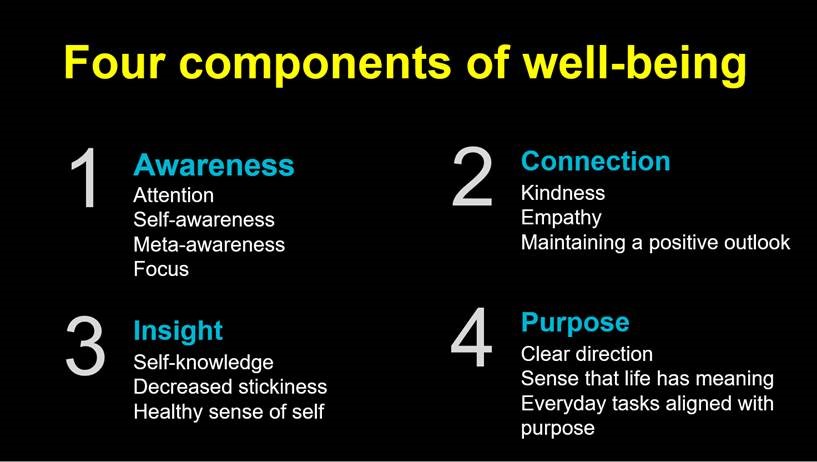Twelfth Annual HOPE Luncheon Seminar,
November 12, 2018

Annual HOPE Luncheon Seminar focused on Brain Health and Wellness
We had a fabulous HOPE Luncheon Seminar last week! We were 300-strong, filling the Plaza ballroom on Tuesday, November 6 with good cheer despite the rain.
We’ve had many requests for the slides that were presented during the luncheon. We are happy to provide a re-cap here.
FOUR KEYS TO WELL-BEING
Keynote speaker, Richard J. Davidson, PhD, gave an inspiring talk titled the “Four Keys to Well-Being.” Dr. Davidson is an acclaimed neuroscientist and founding director of the Center for Healthy Minds at the University of Wisconsin–Madison. He speaks at conferences around the world about the brain’s ability to re-wire itself and the proven benefits of meditation.
Davidson has concluded from years of brain research that well-being is a skill. Practice, practice, practice and you can improve resilience and positivity. He outlined four components rooted in neural circuits that can be strengthened to create enduring change in our lives. For more information, please read Davidson’s article “The Practice of Well-Being” published in Purist in the run-up to the HOPE event.

STAYING BRAIN HEALTHY
Our next speaker, Dr. Samantha Boardman presented fascinating slides on the three keys to braing wellness: diet, sleep and exercise. Dr. Boardman is a psychiatrist at Weill Cornell Medical Center and a specialist in Positive Psychology, the study of happiness.
1. DIET
As a psychiatrist, Dr. Boardman always probes into patients’ diets, because nutrition is as important to psychiatry as it is to cardiology or gastroenterology. She cited a study in which subjects ate only fatty and sugary foods and developed impairments in learning and memory in four days:

Dr. Boardman also cited a study in which young adult subjects were put on a diet of more daily fruits and vegetables. The participants reported improved vitality and motivation in as little as two weeks.

In keeping with these studies, Dr. Boardman always prescribes a Mediterranean style diet that emphasizes fruits, vegetables, fish, nuts, and unsaturated oils (olive) for optimal mental well-being.
2. SLEEP
Mental Health deteriorates quickly without sleep, Dr. Boardman said. Many evidence shows that people who don’t get enough sleep are less inclined to interact with others, robbing them of healthy social bonds. Furthermore, when we lack sleep, other people perceive us as socially repulsive, creating a vicious cycle that may be contributing to the public health problem of loneliness.

In one of her most startling slides, Dr. Boardman revealed the extent to which we allow our phones to interfere with rest. She urged us all to do better!

3. EXERCISE
A sedentary lifestyle is worse for your health than smoking, diabetes and heart disease, Dr. Boardman said. It is also bad for our brains. Most of us sit still for 13 hours a day, not including sleep hours, she said. Dedicated workouts are good, but we need to move more in general – stroll around the block at lunchtime, take the stairs instead of the elevator, walk instead of call a cab. Evidence clearly shows that being active and spending time outdoors improves our resilience, motivation and positivity.

HOPE AWARD FOR DEPRESSION ADVOCACY
First, we learned from outstanding experts on brain health and wellness. Then we laughed along with author/actress Ali Wentworth, who accepted the HOPE Award for Depression Advocacy with keen and funny observations about her own ups and downs, therapy and medication.
Bringing the conversation full circle, Ali also touched on the theme of kindness that Dr. Davidson highlighted in his presentation.
“I do believe in kindness, and the other thing is it is a good time right now to hug your friends, hug your kids,” she said. “Hug and love everybody.”

